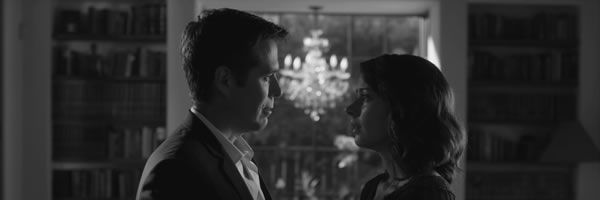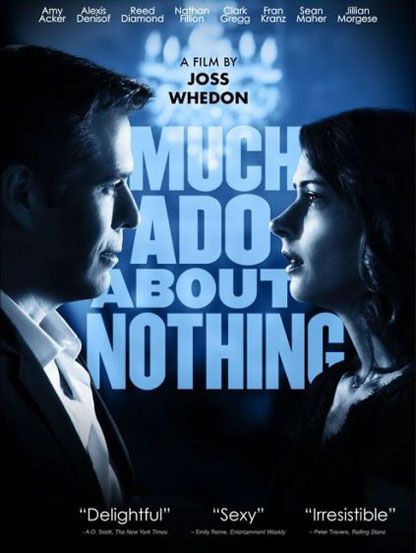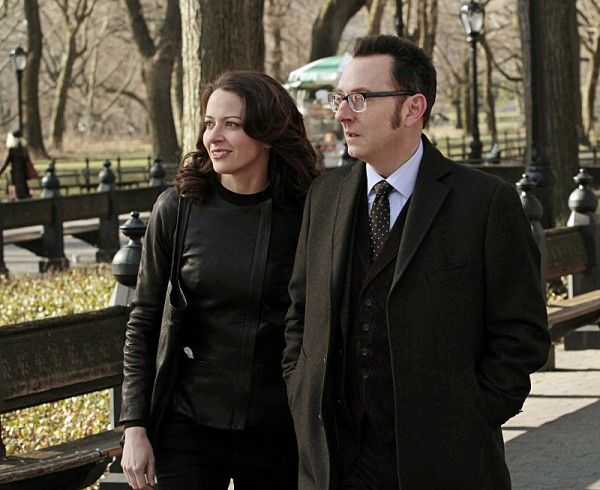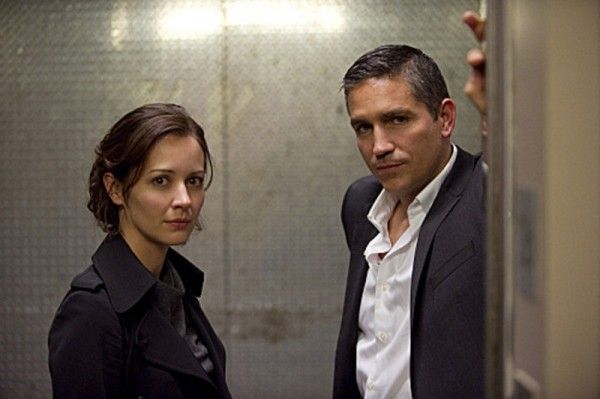When filmmaker Joss Whedon decided to take on Shakespeare for Much Ado About Nothing, now out on Blu-ray/DVD, the result was a contemporary and charming spin that was shot in just 12 days, in and around his house. The story of sparring lovers Beatrice (Amy Acker) and Benedick (Alexis Denisof) is a series of comic and tragic events that offer a dark, sexy and, at times, absurd view of the game of love. The film also stars Clark Gregg, Nathan Fillion, Fran Kranz, Sean Maher, Reed Diamond, Tom Lenk and Jillian Morgese.
During this recent exclusive phone interview with Collider, to promote the film’s release on Blu-ray, DVD and digital, actress Amy Acker talked about how surprised and excited she was about the reaction to the film, how nervous she was about her first meeting with Joss Whedon, back when she auditioned for Angel, that he still has the same approach to storytelling that he’s always had, and what it’s like to be a part of the Joss Whedon family. She also talked about her work on the CBS drama series Person of Interest (in which she plays the unpredictable Root), how show creator Jonathan Nolan runs a similar creative environment to Joss Whedon, and the possibilities of what’s to come for her character. Check out what she had to say after the jump.
Collider: Aside from the fact that anything that Joss Whedon touches seems to turn to gold these days, could you have had any idea that people would have responded to Much Ado About Nothing, as strongly as they have?
AMY ACKER: Honestly, I don’t think we knew if anyone was going to see it. We had done these readings for years, and we had heard Joss say, “Oh, people should see these readings. It would be so fun to film these readings.” But until the first day of filming, we didn’t actually know that we were making a real movie. And then, he said, “Dr. Horrible had good luck on iTunes, so maybe that will happen.” I think some people thought it might have just been for Joss’ personal video collection. It was really fun to go to all the festivals and get to see the movie with different audiences, all over. My parents took probably 50 people to see it. There were so many people who would say, “This is not my thing, so I’m probably not going to like it,” but across the board, people came out saying, “I totally got it! That was so fun! I loved it!” The most exciting thing was changing people’s opinions about what they thought a Shakespeare movie would be. Most people are introduced to Shakespeare in a high school English class with people reading it out loud, and no one really knows what they’re saying. It’s meant to be performed and watched.
Did it take actually seeing it in a theater with an audience to make it feel like it had become a serious project?
ACKER: A little bit. Joss really kept it hidden, even from all of us, after we finished. He showed me one scene, and then I didn’t see it again until about two weeks before we went to Toronto. We didn’t really know what we had made. We knew we had a lot of fun doing it. He would call and be like, “I think it’s really good.” It was exciting to see how excited he was about it. It was already my ultimate part to play, so getting to play it on film with all of my best friends and one of my favorite people ever, Joss, directing it, and doing at his house, it will be hard to top that job.
So many aspects of the project seem so crazy, from filming it around someone’s house to shooting it in black and white to having it be set in present-day. Did you ever worry about how Shakespeare purists would react to it?
ACKER: Well, we had done these readings, so we had a sense of what we were going to be doing. There was so little time after when he said we were gonna film it, and then we started filming it about two and a half weeks later. There was really only enough time to learn the lines, which was good. We didn’t get time to panic, which we all should have done. This past summer, when we were going for the London premiere, I sat down on the airplane and had this horrible feeling in my stomach that it could all go terribly bad. We were taking a Shakespeare movie that we made at a friend’s house to London. That was terrifying. But then, we got there and it was received so well. It was an amazing trip.
Did you ever think about how Angel fans would react to getting to see you and Alexis Denisof together, in this way?
ACKER: Not when we were shooting it. Alexis and I have been friends since Angel. We see each other pretty often. We think of each other outside of Fred and Wesley because it’s been a long time. But after we saw it on film, he turned to me and was like, “This is like Fred and Wesley, all grown up. I think the fans are gonna really like that.” We had the realization, watching it, that that would be a fun thing for people who had seen those characters before.
When was the first time you met Joss Whedon, and what do you remember about the first introduction you had with him?
ACKER: I had just come out to L.A. and I had been here about a month, and I got an audition for Angel to play the part of Fred. I had to do a scene about a librarian. I went in, and then I got called back the next day, so I went and met Joss, that day. I wish I remembered it better. I was so nervous that I just don’t remember the whole thing. Growing up, in college, my boyfriend and his roommate had Buffy night, every Tuesday night. That was the place to be, if you were lucky. So, I was familiar with Joss’ writing and was already a big fan, before then. I was really excited to meet him, and thought the show and the part was a lot of fun. Also, I didn’t know that it was going to be for a series regular. At that point, it was just for an episode.
How different does he work now, as opposed to when you first worked together?
ACKER: The great thing is that he really does feel the same. He’s always had such a clear vision of what he wants to do when he’s directing. I feel really lucky to have such a collaborative work environment, especially with him and Alexis and I. It was that way with everyone in Much Ado. That’s why it made it possible to shoot it so quickly, and to have us all in his house. He has a way of talking to actors. You can see things transform, just by him saying a sentence to someone, or you can feel it in yourself. People get really excited about working with him, and feel lucky when they get to work with him, over and over again. That’s how he’s been, since the beginning. The funny part about when he was having all of The Avengers press about how amazing he is, I was like, “Oh, people didn’t already know that?!” I just assumed everyone knew that about Joss already. I’m glad that they do now.
When you become part of the Joss Whedon family, you know that you’re going to cross paths with many of the same actors and work with them on different projects. For someone like you, who comes from a theater background, does it feel very much like a theater troupe?
ACKER: It does. It’s so comfortable. Doing Much Ado was such a special thing because I knew everybody involved. With people you hadn’t worked with before, you would watch them on shows and want to work with them. It has that feeling of a repertory theater where you have a comfortability with the actors and the director already, that’s built in, and you can skip over the part about feeling weird about doing stuff. With most of those people, it’s great to have them as a resource, too. I think they’re all such great actors. I can be like, “Does this look totally stupid? Does this work?,” and they’re all really honest and helpful.
What’s it like to do something like Person of Interest, where you’re playing such a different kind of role than anything you’ve played before, and who’s not like anything else on TV?
ACKER: I love Root. I’m so excited to get to play this part because I feel the same way. When I got the job, the first episode I was in, I played this psychiatrist. They only revealed, in the last scene, about Root. I didn’t really know what part I was signing on to play because it was a different character, and then it was revealed. Every time I get a script, I’m like, “Oh, my gosh, I love this character! She’s so different.” I don’t think there are that many characters like Root. I’m always like, “Maybe I’m the crazy one, but maybe she’s not that crazy.” Every time you think that she’s crazy, she starts getting validation for the things that she’s doing. When we did that first episode and we switched to Root, which was the last scene of the Season 1 finale, I thought, “What is this character? Does she just become mean, and like the person you see on TV that’s mean?” But, she doesn’t have to be what you expect her to be. It’s been a fun thing to discover who she is and what in the world is going to happen.
Do you see any similarities in the way that Joss Whedon works and the way that Jonathan Nolan works?
ACKER: There are a lot of similarities between working with Joss and working with Jonah. Jonah has created a very similar environment, especially in this season of the show, where he’s got a real ensemble. It’s a gang of people who all don’t really have a place in the outside world, and who have come together to work for good. It has a similar feel, to me, that Buffy and Angel do, with the ensemble vibe and different people who may not normally go together, working together, as a group.
What can you say about what’s to come for Root and where her journey is going?
ACKER: Well, now that she’s out of the mental institution, I think it’s gonna really be exploring how her relationship with the Machine develops and how people respond to that, now that the Machine is talking to her and helping her. There is some fun stuff coming up with Sarah [Shahi]. They don’t give us a lot of information. I don’t know much, which is a fun thing. This is one of those parts that they can take in so many different directions, so when I get a script, I’m like, “Oh, that’s where we’re going, this week.” I did a scene with Michael [Emerson] and, after we rehearsed the scene, Michael was like, “Well, that changes the whole show.” It’s just so much fun.
Would you like to see Root find some sort of redemption, or is she too far passed that, at this point?
ACKER: I’m not sure if she needs redemption or not. I feel like, in the past, she’s mostly been acting out of the best interest of the Machine. I feel like most of the people that she’s had to kill have been pretty bad people anyway. They all kill bad people on the show, too. I don’t know if redemption is something that she needs. It seems like she’s gotten validation for the things that she’s done. She was working towards this relationship with the Machine, knowing what she thinks the Machine is capable of and is ultimately going to be. Along the way, the Machine is now contacting her and helped her to escape. All the things that the Machine is doing seems to say that she’s on the right path for what she thinks is going to happen.
Much Ado About Nothing is now available on DVD. Person of Interest airs on Tuesday nights on CBS.




